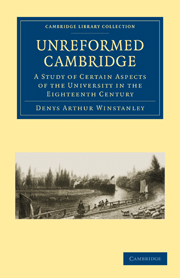CHAPTER II - DEGREE COURSES
Published online by Cambridge University Press: 07 September 2010
Summary
In the spring of 1784 a young Frenchman was escorted round Cambridge by John Symonds, Regius Professor of Modern History. As is the way of foreigners he asked many questions, especially as to the courses of study pursued by the undergraduates, and found to his surprise that his guide was not always able to answer his enquiries. “Although he is a Professor in one of the colleges” he contemptuously noted in his diary “he does not know how the teaching is conducted and was obliged to have recourse to old books, to look up the formation of the University and so forth.” Yet the Professor's ignorance was quite excusable. There were more ways than one by which an undergraduate could attain a degree, and those ways were not only intricate but frequently did not exactly coincide with those set out in the statutes. Changes had been made in the course of three centuries, mainly by way of abandoning or modifying statutory requirements, and consequently what never had been simple had become increasingly complex. No one who has studied the history of the University can refuse sympathy to Professor Symonds in his difficulty.
In the eighteenth century, as always, by far the greater number of undergraduates proceeded to the degree of bachelor of arts. The statutes decreed that a candidate for this degree must have resided twelve terms, performed certain exercises known as acts and opponencies, and undergone an examination: if he satisfied these tests he could in his twelfth term of residence be admitted by the Vice-Chancellor “ad respondendum quæstioni”, and thereby become entitled to proceed to the Schools to answer the question which was taken out of the Prior Analytics of Aristotle.
- Type
- Chapter
- Information
- Unreformed CambridgeA Study of Certain Aspects of the University in the Eighteenth Century, pp. 39 - 92Publisher: Cambridge University PressPrint publication year: 2009First published in: 1935

